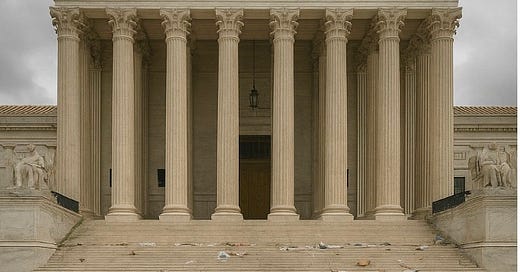Another Judge Admits Alien Enemies Act is Unreviewable
A Trump-appointed judge in California this week made another strong argument that the courts have nearly nonexistent authority to second-guess the president's key deportation policy.
The Supreme Court continues to show what a mess it has made by intervening in President Trump’s invocation of the Alien Enemies Act in March. Following Judge James Boasberg’s reckless handling of the first AEA lawsuit in Washington—which resulted in SCOTUS vacating his hastily issued orders banning the deportation of illegal Venezuelans tied to Tren de Aragua but insisting the illegals were owed due process—courts across the country have rendered disparate opinions in similar lawsuits.
As I explained in an April column, several judges including Supreme Court justices have conceded the questionable role of the judiciary in determining the legality of the AEA. Boasberg himself admitted his authority in handling the matter represented a “close call” and that the lawsuit raised “fundamental and sensitive questions about the often-circumscribed extent of judicial power in matters of foreign policy and national security.”
SCOTUS made things worse last month by kicking an AEA lawsuit back to an appellate court in Texas. (My explainer here.) Noting “conflicting rulings on the underlying legal issues,” Justice Brett Kavanaugh wanted the court to schedule oral arguments in the case and bring a “prompt and final resolution” on the question as to the president’s sole authority to administer the AEA.
Meanwhile, judges across the country, taking their cue from SCOTUS, keep halting action related to AEA. But in doing so this week, Judge John Holcomb, a Trump-appointee on the district court in central California, made clear his view that the judiciary is trespassing on executive branch authority.
“[The] Court concludes that, while the Court may interpret the AEA, that interpretation is limited to deciding whether the President has found that an invasion or predatory incursion has been perpetrated, attempted, or threatened,” Holcomb wrote in a 26-page order on June 2 prohibiting the removal of an illegal Venezuelan and conferring that protection to other similarly-situated illegals. “And, because the President has made such a finding in this instance, the Court may not entertain Arevalo’s various challenges to the findings contained in the Proclamation or to the President’s exercise of his AEA authority.”
Holcomb continued. "[The] plain text of the AEA makes clear that the President’s authority to detain and remove noncitizens hinges upon the President’s ‘proclamation’ that ‘any invasion or predatory incursion is perpetrated, attempted, or threatened against the territory of the United States.’ The AEA’s grant of authority to the President is close to ‘unlimited’…and it includes the ability to decide whether an invasion or predatory incursion has occurred.”
Holcomb further concluded the plaintiff in the case is “unlikely to succeed on the merits of his claim that the Proclamation is unlawful.”
The full order is here and worth a read.
The Texas case is set for oral arguments before the Fifth Circuit in Texas on June 30. (Judge James Ho, as I covered here, eviscerated SCOTUS for kicking the case back to his appellate court.)
Once the Fifth Circuit rules—and that could take months—the entire AEA matter will finally reach SCOTUS. And what then? What if the majority of justices agree with other judges including Boasberg and Holcomb that the judiciary has no role in the administration of the Alien Enemies Act? And if so, how can the court nonetheless demand some sort of due process rights for those covered by the AEA?
If the court cannot question the president’s purview over foreign affairs or national security related to the AEA, how will the justices square the circle of “due process” it established in the April and May decisions.
Unintended—or not—consequences of the SCOTUS-created debacle are playing out in non-AEA litigation. For example, a Biden-appointed judge this week—without allowing the Trump administration to respond and within hours of the filing of a lawsuit—halted the deportation of the wife and children of an Egyptian man charged with attempting to kill several people attending an event in honor of Jewish hostages in Boulder on June 1. (The family members also are Egyptian citizens.)
When judges feel emboldened to step in and stop the deportation of non-citizens living with another non-citizen who tried to murder Jews in broad daylight in an American city, the country is in new, and dangerous, territory.
Thanks, John Roberts.





Julie: if an army crossed our borders illegally, does that army get to receive “due process”?
Looks like SCOTUS is engaged in the exercise of slow walking. I do NOT trust the motives of The Court